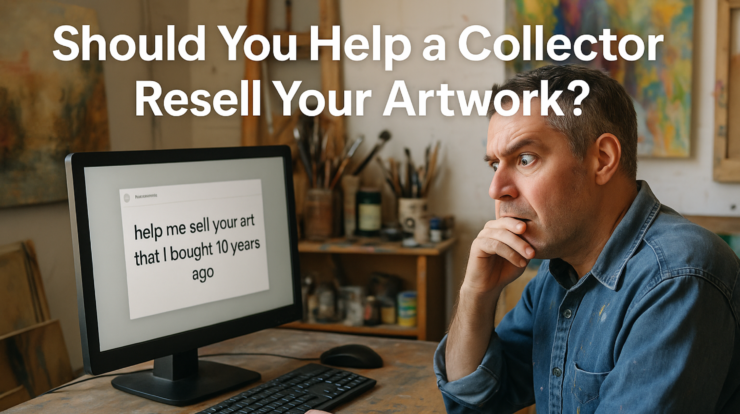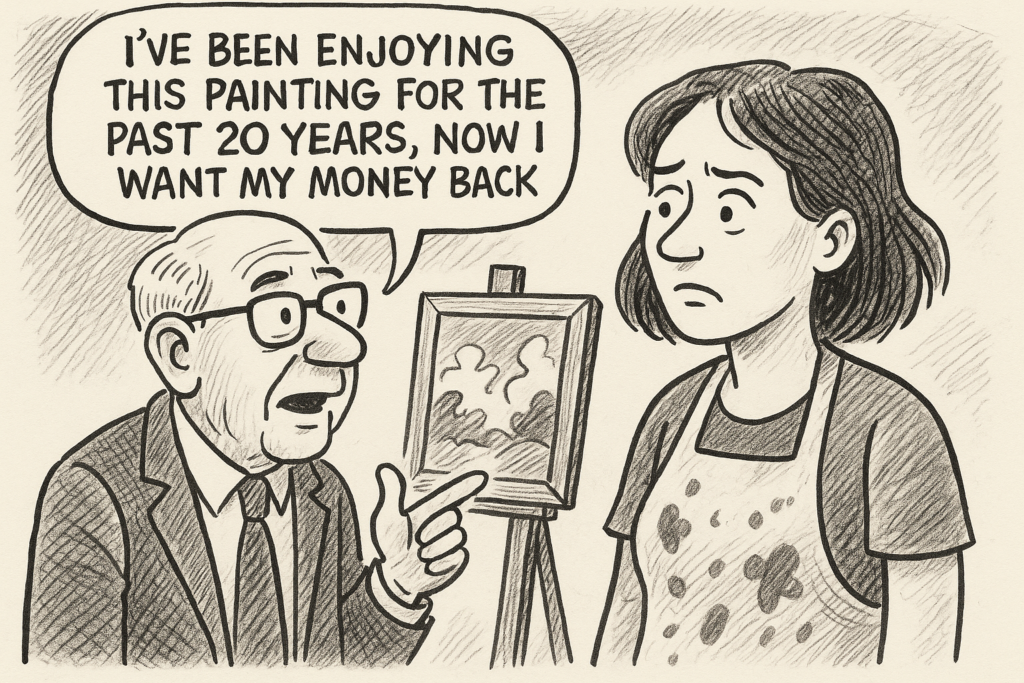
Every so often, I hear from artists who have been contacted by a former collector—or more often these days, by a collector’s family—asking if they’ll help resell a piece of artwork. Just recently, I had a conversation with an artist whose client from decades ago reached out, hoping the artist would take a small painting back and help find it a new home. I’ve also heard from artists approached by heirs who have inherited artwork and aren’t sure what to do with it.
These kinds of requests can leave an artist feeling conflicted. On the one hand, there’s a sense of loyalty to the collector. On the other, it’s not always clear that taking back or reselling work is the best—or even appropriate—course of action.
Let’s take a look at how to approach these situations with clarity and professionalism.
First, Check the Assumptions
There’s often an unspoken assumption behind these requests: that an artist is somehow obligated to help rehome their past work. But unless you’ve agreed to offer resale assistance upfront (which is rare and usually unwise), you are under no obligation to do so.
You’re not a resale gallery or an estate liquidator. Your energy and effort are best spent creating new work and building future connections—not backtracking into old ones. That doesn’t mean you can’t help—it just means you get to decide whether doing so serves you.

If You Do Decide to Resell the Work
In some cases, it might make sense to help. Maybe the collector was a loyal supporter. Maybe the work is still a good representation of your current style. Maybe you feel a genuine desire to be of service. If that’s the case, here’s how I suggest approaching it:
-
Treat it like a consignment. You’re now functioning as a gallery, even if it’s for your own work. That means you should take a commission—typically 50%. That may feel steep to the client, but it reflects your effort and platform, and it’s standard practice in the art market.
-
Price it in line with your current market. If your prices have increased, the collector may make back more than they paid originally—even after commission. But that’s not guaranteed, and they need to understand that.
-
Skip the provenance story. Unless the collector insists, there’s no need to explain that the work is pre-owned. Buyers care more about the art than its travel history—especially for smaller or mid-range pieces.
If You Don’t Want to Resell the Work
If you’d rather not reopen the chapter, you’re well within your rights to say so. Here are some suggestions you can offer instead:
-
Recommend a local resale or consignment gallery. Many communities have secondhand or vintage art sellers who may be open to reselling work, particularly if it’s in good condition and by a known artist.
-
Point them to online resale platforms. Websites like Chairish, 1stDibs, or even eBay or Etsy (if the seller is willing to handle the logistics) can be useful for selling artwork. The market will be more casual, but the reach can be wide.
-
Suggest donating the artwork. Museums, libraries, hospitals, or nonprofit organizations sometimes accept art donations—particularly if the donor is more interested in a tax deduction or legacy than in recouping value.
-
Encourage them to gift it. If resale isn’t a priority, suggest passing it along to a friend, family member, or young collector. There’s something powerful about giving art a new life in a new space.
One Last Note
These conversations, while sometimes awkward, are a reminder that your work has a long life beyond your studio. Someone cared enough to collect it—and even if their circumstances have changed, your art still matters to them.
That doesn’t mean you’re responsible for its next chapter. But you can choose how, or if, you want to be involved—and that choice should reflect where you are in your career and what serves you best.
How about only offering a “trade in” value, say 30% off a new painting, then any resale of the old art is yours to keep!
This is very relevant to me. I recently had the husband of a dear friend approach me and ask if he could return the paintings that they had acquired from me over the years. No money was asked for. My friend has Alzheimer’s and is in a home and he was selling their house. I took them. Another friend came by and saw the pieces. His father had raced at the Woodstock Racetrack years before, and one of the paintings was of the practice sulkies leaning against the barn, both of which brought back wonderful memories to him. The barn had been destroyed by an arsonist. I gave him the painting. He is thrilled, as am I. It is in a wonderful home. One never knows what will become of one’s work.
i like the expression of the guy in the video. very funny! i get asked to deal with my past art all the time. its my policy to buy/sell under the same conditions i do for all art offered. If is economically viable and feasible the answer is yes, if not so be it. often the offers are being made not from clients or heirs but from minor dealers or speculators who have bought at auction and want to cash in. if they are up front about how acquired i will consider but if the story is fishy ]not an unusual circumstance] i will not only not take the piece but actively track the sellers activities. this is based on being a very active first and secondary market dealer of art.
for most artists it just does not work to take art back.